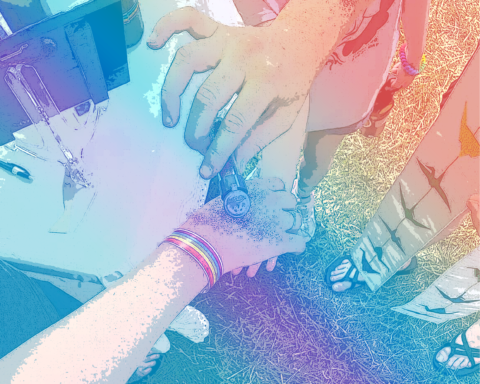We all have a little bit of ego. It is human nature to be a little selfish, want some attention, and move our own agendas around until they are fulfilled. It’s totally normal. But what happens when the perfect space along with the perfect storm incubates our egos to a growth point of absolute destruction? And what if that space, that perfect little incubator, is the church?
We’ve seen throughout the centuries and with the advancement of technologies like radio, then TV, then streaming, cable, podcasts, etc. that someone, a person or people, can drive the motivation and the charisma of a faith space. They may be preachers, directors, musicians, televangelists, or lay leaders. There is something about these particular folk that attracts people. People like Jan Crouch and Tammy Faye Baker, televangelists of the 80s and 90s, even wore extravagant outfits, makeup, and wigs to fully personify their stance in the faith-based spotlight. Jim Baker, Jerry Falwell, and Paul Crouch had big hair, golden jewelry, and fancy suites. These people had (and have) egos of Righteous Gemstone magnitude that are too big to hold. And as history can show us, their egos were their demise. Why?
Ego needs power to keep it going. Ego needs control of the narrative to fuel it. And the church is the perfect place for that. Depending on the context, some churches and church institutions are solely regulated and controlled through congregational support, ministers, or the minister may have all the power which makes it a prime target for manipulation. There is less oversight as well as a church cultural narrative that a minister knows best because they are called by God to do this work. And when you have God on your side and a call from God, who would argue with that?
And while this discussion is not meant to over generalize the church or discount the magnitude of social change that faith movements and spaces have had on our world, this discussion is needed because ego does find itself in many faith spaces. Also, while the fundamentalist and evangelical movements have their fair share of ego driven leaders, progressive and mainline churches and movements are not immune. In fact, when ego and power are veiled with the words, and mostly only words, of justice, love and peace, the impact is much worse. Words, flattery, accolades, and sermons are not actions, but they tug at the heart, they are easy, and they give us the feelings we need to think we are doing good. And the ego needs words to win people over. But the institutional gaslighting of a promised day of justice when nothing is being done is fully disastrous for a church and the institutions that surround it.
Time and time again we have seen ego-driven church leadership destroy the church. Power becomes more and more consolidated. Communication and strategy become more and more secretive. Control becomes central in order to feed the ego. Money is wasted and spent on gimmicks to keep the ego satisfied. And at some point, the incubator gets too hot with members of the church becoming more and more suspicious. The incubator gets too hot with young folk wondering where the church is on issues and why is it not doing anything impactful, relevant, and just. That incubator becomes inflamed with mistrust only to keep going while the flames are apparent.
The world could be burning down around the ego, and it would not see it. The ego creates a narrowness of vision while surrounding itself with other egos that thrive off the selfish energy. The so-called “yes” person finds their way toward the centrality of ego, keeping it going, leaching energy from it and riding the wave of power toward an undeniable and, mostly, sad ending.
And all the while, the people most impacted by the injustices, the racism, the white supremacy, the homophobia and transphobia, the poverty and homelessness, they are lost in the shuffle. They create a wonderful mask for said ego, but they could care less about programs, organizational structure, conferences, interior institutional jargon, HR goals, and, yes, even the polity and policy we deem so important (most of which we never see through to action). People who are suffering are trying to survive.
Which begs the questions: Do we need another gimmick to make our church seem cool and “with it”? Do we need technology because we think that is what gets us young people? Do we need yet another brand, consultant, advertising agency, and vampires of dying churches?
There is a simple answer. No. You see, ego sets up the church like a game. It complicates theological claims and social ideologies with organizational structure, convoluted funding, and institutional expectations all to continue the cycle of playing the game of being church. The winner of said game comes out on top with maneuvers of words, intellect, conceived notions of power and colonization, and above all, the lack of authenticity and showing humanity. We need not complicate the game any further, in fact, we need to fold up the board, put away the pieces, and put the game in the furthest corner of a deep, locked, closet. The game of church, the game of policy, the game of institutional reorganizing will be the detriment of the authentic church as we know it.
But shall we move into less cynical prose, and vision a church and a faith without the ego?
To be clear, the ego is not the same as self-care. Our bodies are our own and our God calls us all to take care of them. A church with members that rest, that play, that live lives based off pleasure and not productivity is a church that gives glory to the Creator (check out The Nap Ministry). We are not what we produce nor are we what “ministry” tells us we should be. Taking care of ourselves means that we listen to our bodies, not our egos for our egos will send our bodies down a path of absolute gutted, rottedness.
The ego doesn’t like authenticity of the one who carries it nor of other people. Being who the Creator created us to be, in all our forms, identities, and manifestations, is central to breaking free from an ego-centric faith. This intentional work consists of therapy and counseling on a regular basis (meaning institutions should be providing access to mental health care), asking the hard questions of ourselves, and the affirmation of those we trust. This work is digging deep into the very essence of ourselves…and that is hard, hard work. The ego wants us scripted, wants us to play within the boundaries, wants us to get in line or get left. But authentic living breaks the ego and releases the wholeness of a person which is in and of itself divine. Can we imagine a church where all are living into our authentic selves? Can we imagine a faith where leaders are fully themselves inviting others to do the same and bring forth the Spirit in who we are as the people of God?
Reforming is the kryptonite of the ego unless said ego is in charge of said “reform”. Reform takes challenge in ways that are gentle, meaningful, and based out of love for God and church. But the ego doesn’t like “pushback” and often responds in defense, gaslighting, and anger. And that is just something we have to ignore because a fire without oxygen is no fire at all. Jesus was the ultimate challenger of authority and ego, and learning from his example is crucial for the future of a justice minded church. Openness and nimbleness is key to create the fluidity for pivoting in times of crisis, listening to our neighbors who need help and support, and supporting members of our churches and staffs that work their hearts out for the faith and have gotten lost in the shuffle of larger institutional change.
Above all else, the people we say we are serving, walking with, must be front and center. They are the ones suffering even more so from an ego-centric mentality and faith. We must serve directly, financially, reparatively, and doing so at the risk of losing it all. The grip on power must be loosened because our siblings are dying, starving, being beaten in the streets, murdered by police and transphobia. Guns plague our world and terrorize our children. Queer folk are losing rights and trans kids are being told they are not enough. Our Native American siblings, some of which have served this ego-centric church, are being forced to live into poverty and left out to fend for themselves because of the ramifications of the Doctrine of Discovery, colonization, and “justice minded” policies that have not been acted upon, which have all been deemed justified by the hand of the church. Faith leaders of color are not being paid enough nor are immigrant churches being supported.
The ego has drifted us astray onto another planet of chaos, disconnection, and irrelevance. If we continue down this road, the already falling numbers of our church memberships will exponentially fall within the next decade. The church will be no more in two decades. More and more people on the margins will be ignored only to be the veil of the so-called “progressive” church. This downfall may not be a bad thing because basing “success” on numbers is capitalistic, and at some point the ego needs a wakeup call and hopefully snaps out of delusion.
But with God there is always hope, for some of us love God and faith so much that we are annoyingly persistent in calling out the forces that fall short. And yet, at some point, we will grow tired, and we will move on, creating new forms of church…and that is where the hope lies. The hope lies in the energy of the release from the bond of a church that has lost itself, of young people expressing a multitude of faith perspectives, doing the work on the ground and not apologizing for it. The hope lies in the non-coopted imagination of what church can be. There is only so much allegiance and energy that some of us can give to a church that does not see us, validate us, nor care about the core of Jesus’ mission on this world. A mission of love, grace, hospitality and justice for all people.
Sometimes you just have to leave the ego and let it destroy itself, but it is in hope and love that some of us won’t have to do that.
Rev. Lee Catoe is the editor of Unbound. He is a native of the small, rural town of Jefferson, South Carolina. He is a graduate of Presbyterian College (2010) with a B.S. in Biology and a graduate of Vanderbilt Divinity School (2019) with a Masters of Divinity. His thesis work incorporated the intersection of songwriting and Queer Theology with a focus on incarnational theology and embodiment. Lee is a songwriter, plays guitar and, occasionally, performs. He also freelances as a graphic designer and Instagram manager for his beagle, Rupert (yes, he has an Instagram). Lee and his husband, Will, now live in Washington, DC.






Unbound Social